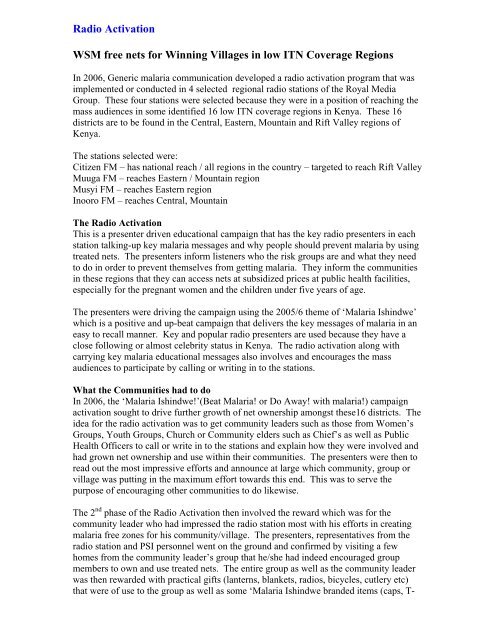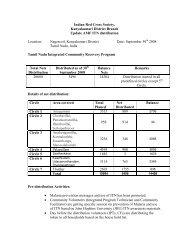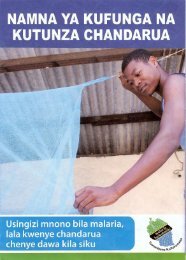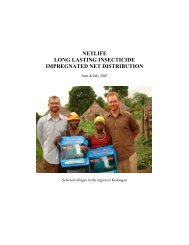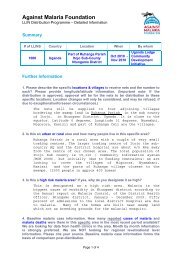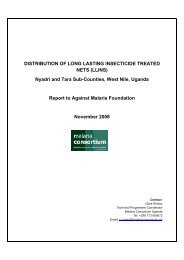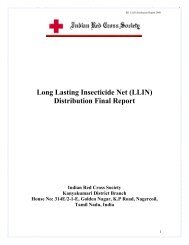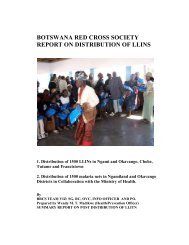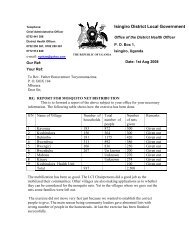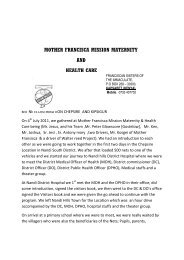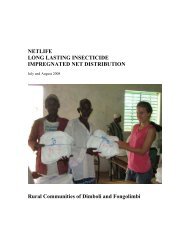Radio Activation WSM free nets for Winning ... - Against Malaria
Radio Activation WSM free nets for Winning ... - Against Malaria
Radio Activation WSM free nets for Winning ... - Against Malaria
Create successful ePaper yourself
Turn your PDF publications into a flip-book with our unique Google optimized e-Paper software.
<strong>Radio</strong> <strong>Activation</strong><br />
<strong>WSM</strong> <strong>free</strong> <strong>nets</strong> <strong>for</strong> <strong>Winning</strong> Villages in low ITN Coverage Regions<br />
In 2006, Generic malaria communication developed a radio activation program that was<br />
implemented or conducted in 4 selected regional radio stations of the Royal Media<br />
Group. These four stations were selected because they were in a position of reaching the<br />
mass audiences in some identified 16 low ITN coverage regions in Kenya. These 16<br />
districts are to be found in the Central, Eastern, Mountain and Rift Valley regions of<br />
Kenya.<br />
The stations selected were:<br />
Citizen FM – has national reach / all regions in the country – targeted to reach Rift Valley<br />
Muuga FM – reaches Eastern / Mountain region<br />
Musyi FM – reaches Eastern region<br />
Inooro FM – reaches Central, Mountain<br />
The <strong>Radio</strong> <strong>Activation</strong><br />
This is a presenter driven educational campaign that has the key radio presenters in each<br />
station talking-up key malaria messages and why people should prevent malaria by using<br />
treated <strong>nets</strong>. The presenters in<strong>for</strong>m listeners who the risk groups are and what they need<br />
to do in order to prevent themselves from getting malaria. They in<strong>for</strong>m the communities<br />
in these regions that they can access <strong>nets</strong> at subsidized prices at public health facilities,<br />
especially <strong>for</strong> the pregnant women and the children under five years of age.<br />
The presenters were driving the campaign using the 2005/6 theme of ‘<strong>Malaria</strong> Ishindwe’<br />
which is a positive and up-beat campaign that delivers the key messages of malaria in an<br />
easy to recall manner. Key and popular radio presenters are used because they have a<br />
close following or almost celebrity status in Kenya. The radio activation along with<br />
carrying key malaria educational messages also involves and encourages the mass<br />
audiences to participate by calling or writing in to the stations.<br />
What the Communities had to do<br />
In 2006, the ‘<strong>Malaria</strong> Ishindwe!’(Beat <strong>Malaria</strong>! or Do Away! with malaria!) campaign<br />
activation sought to drive further growth of net ownership amongst these16 districts. The<br />
idea <strong>for</strong> the radio activation was to get community leaders such as those from Women’s<br />
Groups, Youth Groups, Church or Community elders such as Chief’s as well as Public<br />
Health Officers to call or write in to the stations and explain how they were involved and<br />
had grown net ownership and use within their communities. The presenters were then to<br />
read out the most impressive ef<strong>for</strong>ts and announce at large which community, group or<br />
village was putting in the maximum ef<strong>for</strong>t towards this end. This was to serve the<br />
purpose of encouraging other communities to do likewise.<br />
The 2 nd phase of the <strong>Radio</strong> <strong>Activation</strong> then involved the reward which was <strong>for</strong> the<br />
community leader who had impressed the radio station most with his ef<strong>for</strong>ts in creating<br />
malaria <strong>free</strong> zones <strong>for</strong> his community/village. The presenters, representatives from the<br />
radio station and PSI personnel went on the ground and confirmed by visiting a few<br />
homes from the community leader’s group that he/she had indeed encouraged group<br />
members to own and use treated <strong>nets</strong>. The entire group as well as the community leader<br />
was then rewarded with practical gifts (lanterns, blankets, radios, bicycles, cutlery etc)<br />
that were of use to the group as well as some ‘<strong>Malaria</strong> Ishindwe branded items (caps, T-
shirts, lesos, key chains). The big reward <strong>for</strong> the entire group was also the visit by the<br />
radio presenter whom they had heard preaching the malaria message and who was then<br />
now on-ground practicing the malaria prevention messages by actually demonstrating<br />
how to hang a net and how to treat the <strong>nets</strong> using the treatment kit.<br />
How <strong>Winning</strong> Villages were chosen <strong>for</strong> World Swim Free <strong>nets</strong> and How Distribution<br />
was Conducted.<br />
The radio activation had already assisted in earmarking the communities in the already<br />
low coverage regions who were trying their best to convert to malaria <strong>free</strong> zones or<br />
MFZs. PSI then decided that the best gift <strong>for</strong> these hardworking community leaders<br />
would be to actually ensure that their entire villages where they came from were<br />
converted to <strong>Malaria</strong> Free Zones, by rewarding each and every household with a net.<br />
Half the community leaders came from very needy villages but had still put in some<br />
ef<strong>for</strong>t towards encouraging their members to purchase and use treated <strong>nets</strong>. This was<br />
hence a much needed Christmas gift. To ensure that each and every household would be<br />
rewarded and benefit from the net, PSI and the Royal Media Group representatives<br />
worked with the local administration, mainly the village Chiefs from which the<br />
community leaders came from. In Kenya, a village Chief knows all his villagers and<br />
most villages are anything from 300 – 1000 households. The winning village chiefs were<br />
asked to confirm their household numbers and in<strong>for</strong>m the household heads to come to<br />
their camps on the selected dates to collect their <strong>free</strong> ITN. These confirmations took<br />
about a week and the <strong>Radio</strong> <strong>Activation</strong> teams were ready to roll-out the distributions by<br />
December. However, December is a very crowded month on radio and the exercise was<br />
put on hold until January to ensure the exercise was well conducted and served the<br />
villagers well.<br />
Distribution Summary Table<br />
Date<br />
Village or Sub/Location;<br />
Location;Division;District<br />
18/01/2007 Riakanau;Nthingini-Riakanau;<br />
Karaba; Mwea; Embu<br />
19/01/2007 Kyeleni;Kyanzimbi;<br />
Matungulu; Machakos<br />
19/01/2007 Nguruweini; Kagumuini;<br />
Gaichiri; Maragua<br />
20/01/2007 Kathunguri; Karurumo; Kieni;<br />
Embu<br />
20/01/2007 Kiarukungu; Kimbimbi; Mwea;<br />
Kirinyaga<br />
25/01/2007 Maweni; Voi Central, Voi<br />
Central; Taita Taveta<br />
25/01/2007 Kaare; Kiera; Mwimbi; Meru<br />
South (Tharaka)<br />
02/02/2007 Nubia; Township; Mosocho;<br />
Kisii Central<br />
Populatio<br />
n<br />
# of <strong>nets</strong><br />
distributed<br />
Contact person<br />
3,000 300 Chief Kimeu<br />
Cell +254-722-306909<br />
9,000 680 -<br />
6,297 880 Mr Kimani<br />
Cell + 254-720-421469<br />
6,000 800 Ephraim Gathiomi<br />
Cell +254-721-718207<br />
6,000 800 Senior Chief Henry Karatu<br />
Cell +254-721-116670/ 254-722-<br />
878534<br />
5,720 1,100 Councillour Bi. Amisi<br />
Cell +254-722-674118<br />
5,600 800 Asst Chief Lytton Mbae Ndobi<br />
Cell +254-726-226303<br />
2440 500 Chief Nyakundi ;254-721-784207<br />
Musa Abbas +254-724-997827
Taking the Nets to the Grassroots<br />
Above: Some of the beneficiaries of the latest <strong>WSM</strong> <strong>nets</strong> distribution by PSI
World Swim against <strong>Malaria</strong> (<strong>WSM</strong>) is a not-<strong>for</strong>-profit humanitarian initiative borne two years<br />
ago out of an urgent need to help fight malaria, one of the world’s deadliest diseases, second only<br />
to HIV/AIDS.<br />
Its mission is to marshal universal support and all the available human and capital resources from<br />
like-minded people in helping to stop the disease through distribution of long-lasting insecticide<br />
treated <strong>nets</strong> to the vulnerable poor especially in the hardest hit areas. Every shilling donated to the<br />
course goes to buying a net <strong>for</strong> some of those at the riskiest end of contracting the killer disease.<br />
“Our aim is to have a million people swimming across the world at the same time,” says a<br />
mission statement posted at the <strong>WSM</strong> website. And just judging by the wave with which the<br />
project has swept across the many volunteers’ hearts so far, a million people seems pretty much<br />
an underestimate.<br />
Population Services International, an international NGO working to address social health issues<br />
through social marketing, recently partnered with <strong>WSM</strong> to help distribute <strong>nets</strong> to the vulnerable<br />
poor including pregnant women and children under five in Kenya.<br />
To date PSI has distributed over 5,700 <strong>nets</strong> to seven villages countrywide selected on the success<br />
of their self-driven mobilization exercise to drive malaria out of their villages in an initiative<br />
dubbed creating- malaria <strong>free</strong> zones.<br />
In one of the distribution exercises organized by PSI in January, part of the 5,700 <strong>nets</strong> were<br />
delivered in rural Kyeleni sub-location, in Eastern Kenya’s remote Matungulu division in<br />
Machakos District.<br />
Kyeleni is among the seven villages in five districts that were selected from an initial 61 villages<br />
countrywide by PSI to benefit from the <strong>free</strong> <strong>WSM</strong> <strong>nets</strong> distribution after participating in a<br />
community driven education awareness campaign on malaria prevention. Other regions Kaungani<br />
and Meru in central province, Kisii in Nyanza province and Voi in Coastal province.<br />
Under a mutual agreement, PSI met the cost of logistical delivery of the <strong>nets</strong> to the grassroot’s<br />
beneficiaries besides its normal core of educating the masses on significance of using the <strong>nets</strong> to<br />
protect themselves against malaria.<br />
At Kyeleni, one of the recipients, Kitheu Mutuku, a 28 year old a mother of three could not<br />
initially translate her joy into words as she beamingly picked up her share of the delivery.<br />
“I have always heard about the campaign to protect myself and the young children from malaria<br />
but the cost of the net has never favored me,” marveled Mutuku clutching on to her seven months<br />
old baby, “I am very happy now my baby will no longer live in fear of contracting Nde tema-<br />
(native language <strong>for</strong> malaria). Mutuku is not alone.<br />
Although ITN distribution program has made inroads in increasing the net coverage in the<br />
country, there are still many others who cannot af<strong>for</strong>d the protective <strong>nets</strong> even at the subsidized<br />
cost.<br />
And so <strong>for</strong> Mutuku and a score of others who have never used a net, the <strong>WSM</strong> initiative could not<br />
have come at a better time. In a country where over 50 per cent of the population leave on less<br />
than a dollar a day, one cannot fail to deeply understand the plight of Mutuku.<br />
For further in<strong>for</strong>mation please contact: Population Services International---Rose Kibe on 254-20-<br />
4440125-8 or rkibe@psikenya.org, www.psi.org Or World Swim <strong>Against</strong> <strong>Malaria</strong>-- Rob Mather on -<br />
rmather@btinternet.com <strong>WSM</strong>-- www.worldswim<strong>for</strong>malaria.com


